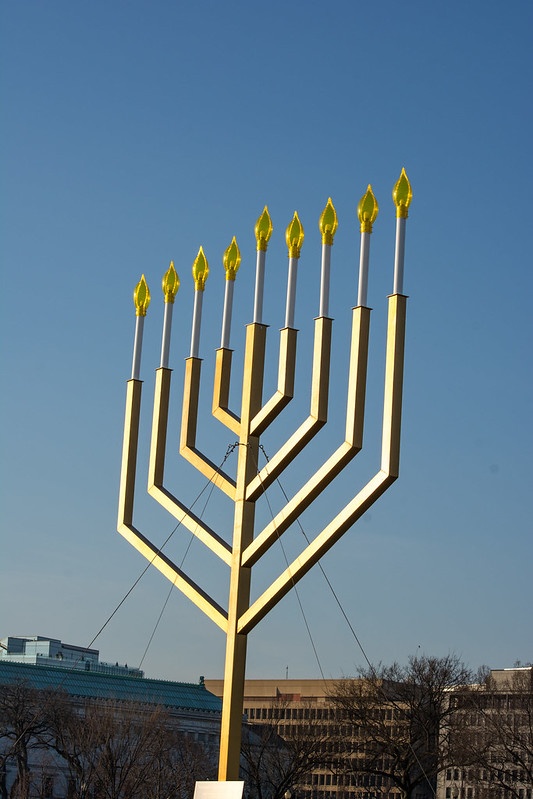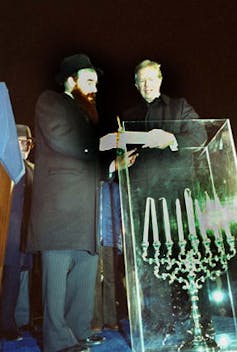News
Biden brings a menorah lighting back to the White House, rededicating a Hanukkah tradition from the 20th century

President Joe Biden’s staff has dispatched invitations to a “Menorah Lighting to be held at the White House” on Dec. 1, the evening when the fourth candle of the eight-day festival of Hanukkah will be lit. The event promises to be quite different from last year’s event, hosted by Donald Trump.
President Trump in 2020 held what he called a “Hanukkah Reception” in midafternoon before Hanukkah began. The reception was a heavily partisan affair, no candles were lit, much food was consumed, and some of the participants went maskless, the raging COVID epidemic notwithstanding. Most Democrats as well as many Jewish leaders stayed home.
President Biden’s “menorah lighting,” by contrast, promises to privilege ritual over reception, focusing on the lighting of the traditional Hanukkah candelabrum itself. Reportedly, the event will be nonpartisan, with COVID-19 precautions enforced. According to the Jewish Forward, no food or drink will be served at all, so masks won’t even need to be lifted. In addition, the guest list has been severely pared down to encourage social distancing – so much so that a senior White House official was quoted as saying it would likely be the smallest White House Hanukkah party in history.
The vice president and second gentleman Douglas Emhoff are slated to be among those in attendance, and for the first time the ceremony will be livestreamed. On Nov. 28, Emhoff also attended the lighting of the National Menorah on the Washington Ellipse.
Overlooked amid these carefully parsed details is a question that, to me, as a historian of American Jewish life and a scholar of American religion, seems far more fascinating and important: How did the office of the president of the United States come to hold official White House menorah lightings and Hanukkah parties in the first place?
White House traditions
For most of American history, the only December holiday that gained White House recognition was Christmas. President John Adams and first lady Abigail Adams, back in 1800, threw the first White House Christmas party, a modest affair, planned with their 4-year-old granddaughter in mind, and with invitations sent to selected government officials and their children.
In 1923, President Calvin Coolidge inaugurated the practice of lighting an official White House Christmas tree. He also delivered the first formal presidential Christmas message. His message assumed, as most Americans of that time did, that everybody celebrated Christmas.

It displayed, according to The Washington Post, “the reverence of a Christian people giving at the seat of their government the expression of their praise for ‘the King of kings’ on the eve of the anniversary of His birth.” Neither Adams nor Coolidge uttered one word about Hanukkah.
Official notice of Hanukkah waited another half-century – until 1979 – by which time Jews had become much more visible as members of American society and government. Ironically, the president who first paid attention to Hanukkah was Jimmy Carter, although he wasn’t the Jewish community’s favorite Democratic candidate. When he ran for reelection in 1980, he got less than 50% of the Jewish vote – less than any Democrat since 1928.
In 1979, following weeks of seclusion in the White House after Iranian students took over the U.S. embassy in Tehran, seizing 52 diplomats and citizens, President Carter emerged and crossed over to Lafayette Park. He lit the large Hanukkah candelabrum, dubbed the “National Menorah,” that had been erected in the park with private funds and delivered brief remarks.
Seeing that Jews celebrate their own holiday in December – Hanukkah – he directed his next annual Christmas message not to all Americans, as heretofore, but only “to those of our fellow citizens who join us in the joyous celebration of Christmas.”
Every president since has recognized Hanukkah with a special menorah lighting ceremony or reception and limited his Christmas messages to those who actually observe the holiday.
Menorah lightings
Hanukkah came to the White House itself in 1989, when President George H.W. Bush displayed a menorah there – a candelabrum given to him by the Synagogue Council of America.
But Bill Clinton was the first president to actually light a menorah in the White House. In 1993, he invited a dozen schoolchildren to the Oval Office for a small ceremony. The event made headlines when 6-year-old Ilana Kattan’s ponytail dipped into the flame and a wisp of smoke was visible around her head. Clinton memorably extinguished the flame with his bare hands.
Menorah lightings grew in prominence during the Clinton years. Memorably, in 1998 Clinton joined Israel’s then-President Ezer Weizman in lighting a candle on the first night of Hanukkah in Jerusalem.
But no White House Hanukkah parties ever took place under Clinton. Instead, he included Jewish leaders in a large annual “holiday party.”
Annual Hanukkah parties
The first president to host an official White House Hanukkah party, and the first to actually light a menorah in the White House residence and not just in its public spaces, was George W. Bush, beginning in both cases in 2001.
Bush made a point of inserting religion into his many annual Christmas parties. He sought to underscore through the Hanukkah party that the White House “belongs to people of all faiths.” Since then Hanukkah has become an official White House tradition.
Hasidic leaders in the distinctive black suits worn by members of their community regularly appeared at these parties. Beginning in 2005 the parties became completely kosher.
Barack Obama maintained the tradition of the White House Hanukkah party, holding two of them in 2013, and Donald Trump maintained the tradition as well. Both in 2018 and 2019, he also held two Hanukkah parties for his friends and Jewish family members – including his daughter, Ivanka – and invited selected non-Jewish guests to attend them. Last year, amid the pandemic, Trump again held two Hanukkah parties. He spoke at one of them and lamented the “stolen election” that he insisted he had won.
The fact that this year the White House is abandoning the Hanukkah reception altogether and returning to the tradition of the menorah lighting suggests a shift back to the religious aspects of Hanukkah.
[Over 140,000 readers rely on The Conversation’s newsletters to understand the world. Sign up today.]
What is truly significant, however, is how much America has changed since Presidents John Adams and Calvin Coolidge invented America’s White House Christmas traditions and paid no attention to Hanukkah at all.
This is an updated version of an article first published on Dec. 4, 2020.
Jonathan D. Sarna, University Professor and Joseph H. & Belle R. Braun Professor of American Jewish History, Brandeis University
This article is republished from The Conversation under a Creative Commons license. Read the original article.





















